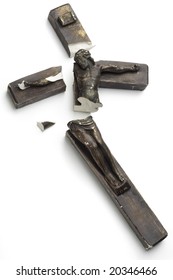Njal’s saga’s setting is uniquely positioned around the Christianization of Iceland. This allows us to see the author's interpretation of how the Icelanders adapted to this fundamental change in their society. Using violence to solve problems (like blood feuds) holds contrast to the modern-day values of Christianity. In the saga, men who have adopted Christianity also hold on to the violent problem-solving methods common to the sagas, like blood feuds. This blog will talk about the interesting contradictions to Christian doctrine that shows up when the Icelanders convert. From revenge killing in the name of God, to planning to kill a family in the same room that your holy objects are in, this saga sees it all.
. Almost immediately after the switch to Christianity, the saga has a killing in the name of God. Hoskuld’s son, Amundi the Blind, confronts his father’s killer. The killer refuses to offer him compensation for his father’s death. Amundi replies “I don’t know that to be just before God” …” seeing that you struck so close to my heart. I can say this-if I were sound in both my eyes, I would either have compensation for my father or take blood revenge, and may God now settle between us.” Amundi walks out of the booth and turns around to find that his vision has returned to him, he says “Praise be to God, my lord. Now it can be seen what He wants.” Amundi then rushes back into the booth and buries his axe in his father’s killer’s head. Even though he is a Christian he still kills in revenge. In this saga, killing someone isn’t a relatively villainous thing to do but even the real antagonist of the saga converted.
19th-century rendering of the Law Rock in Þingvellir. https://en.wikipedia.org/wiki/Althing
Mord Valgardsson, the antagonist of the saga, converted to Christianity. Its known to the people of Iceland that Mord is an evil person. He was partially responsible for the killing of Njal’s friend Gunnar. Mord’s father returns home and tells his son that he needs to kill the Njalssons to regain his authority, a classic villainous plan. After this planning Mord says “I wish, father, that you would accept the faith” … “you’re an old man.” Mord’s father replies “I don’t want to.” … “and in fact, I would like you to renounce the faith and see what happens.” Mord’s father then proceeds to break Mord’s holy objects. He dies soon after that Even though Mord is a true villain, he is Christian. He plots to kill a family in the same room he has holy objects in.
The adoption of a new religion is bound to be met with a little friction. This saga is set in a time that allows it to document the relatively odd and Anti-Christian practices of the Icelanders who call themselves Christians. This saga sees men kill others for revenge in the name of God and the antagonist of the saga plots the death of a family in the same room he holds his holy objects in. Controversy and friction experienced when adopting a new religion like Christianity makes sense, but the way these Icelanders make it work is something else.


No comments:
Post a Comment